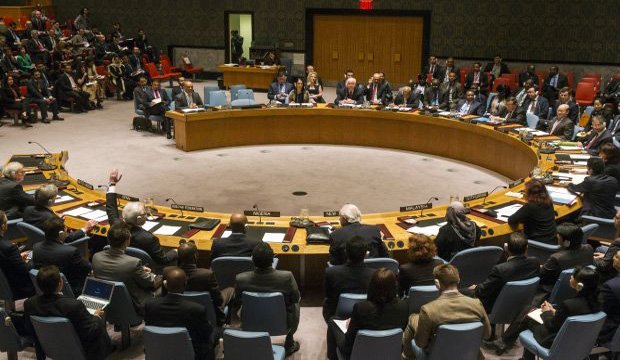This could well be the greatest diplomatic triumph for the Gulf and Arab countries at the United Nations. Who would have believed that mighty Russia, which until recently has been extremely sympathetic to the Houthis, would not be able to impede the UN Security Council resolution on Yemen? What kind of diplomatic efforts did Gulf countries exert to enable them to convince Russia to give its indirect approval to Operation Decisive Storm? What explains this level of international support that the offensive has garnered from the world’s highest political authority? This shift in positions must have been caused by the same logic that led to the launch of Operation Decisive Storm: that it was necessary to rescue Yemen after its legitimate President Abd Rabbuh Mansur Hadi submitted an official request to the UN.
The UN Security Council resolution on Yemen has not only hemmed in the Houthi militias and Yemen’s ousted former president Ali Abdullah Saleh, but also, thanks to the unprecedented level of international support, went so far as to voice rejection of the Houthi coup in Yemen. It also imposed sanctions on senior Houthi figures and Saleh under Chapter 7 of the UN Charter. The resolution was clear enough in that it threatened to take further measures in the event rebels failed to comply with Resolution 2216. In other words, Operation Decisive Storm is merely one of the measures the international community has decided to take in a bid to stop the occupation of Yemen.
The success of these diplomatic efforts, which Saudi Arabia has spearheaded, highlights that Operation Decisive Storm was not a rash step. It is impossible for Riyadh to breach international laws, and it has enough experience and knowledge to take major decisions with wisdom and temperance, even in such difficult times. The UN Security Council is confirming the validity of the Saudi decision and supporting it politically, and perhaps would also support it with military force in case the rebels do not comply with Resolution 2216 within the next 10 days.
The allied countries are theoretically and practically in a more powerful position than the Houthi militia and their ally Saleh when it comes to the war in Yemen. Nevertheless, the Gulf-led coalition insists on pushing towards bringing the war to a swift end and resuming the power transfer. This should take place with the participation of all political factions in Yemen and in accordance with the Gulf Cooperation Council’s (GCC) initiative and its executive mechanism—as well as the outcomes of the National Dialogue Conference. This position has been endorsed by the draft resolution that was submitted by the GCC and approved by the Security Council. War is a means rather than an end in itself for the 10-strong Saudi-led coalition. In fact, the resolution also hinted at Houthi participation in the proposed dialogue process. It also acknowledged the Houthis as a key political component of the Yemeni arena.
Since the start of Operation Decisive Storm in Yemen all political and military efforts have been taking place hand in hand. While Gulf diplomatic efforts are achieving unprecedented success, Iranian foreign policy plunges into deeper isolation and exclusion. While the world stands in tribute to the successful mechanism that managed to convince the stubborn Russian bear, we witnessed how Iran’s isolated Foreign Minister Mohammed Javad Zarif unveiled a new initiative from Spain, although no-one is quite sure how this initiative will contribute to the resumption of dialogue and ending Operation Decisive Storm. The situation on the ground shows the colossal efforts the GCC states have been making on the political level, while all Tehran’s fanfare is “much ado about nothing.”
The Gulf has skillfully delivered a decisive counter-punch to Operation Decisive Storm’s opponents, particularly the Persian Arabs, who have been desperately spreading lies about the war on the Houthis representing an aggression against Yemen. The UN Security Council responded by announcing that the real aggression against Yemen comes from the Houthis and that Operation Decisive Storm is meant to rescue the Yemeni people rather than fight them.
From New York, the GCC member states, except Oman, have given an extremely significant lesson, highlighting their ability to impress the world, whether diplomatically, politically or militarily, while making sure that interests do not clash no matter how different their inclinations are.
